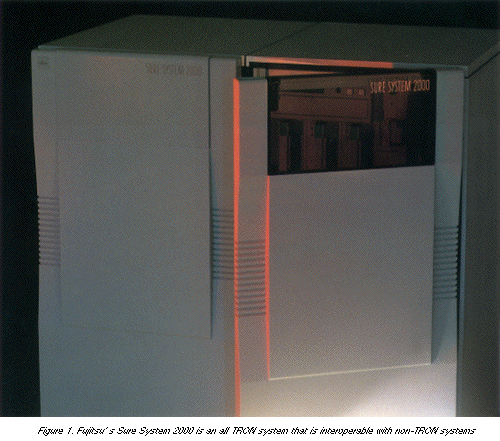

Fujitsu Ltd. is famous as a maker of large computer systems, in particular mainframe computers and supercomputers, so it should come as no surprise that this firm was one of the first Japanese computer makers to develop and market a large computing system based on the CTRON architecture. The resulting product, Sure System 2000 [Fig. 1], is a non-stop continuous operation communications processor that not only uses a CTRON-based operating system (Real-time Operating System based on CTRON, or ROSEC), but it also uses F32/300 (Gmicro/300) 32-bit microprocessors based on the TRON VLSI CPU architecture. Thus this is a TRON-specification system from top to bottom.
As with other non-stop continuous operation communications processors, the Sure System 2000 uses a central processing unit (CPU) based on modules, each with its own microprocessor and memory. These CPU modules operate redundantly in parallel to each other, so if one malfunctions, the other modules keep the system running. The result is fault-tolerant operation that allows the system to survive a hardware failure, and, in addition, it allows for the system to be upgraded and expanded without any interruption in service.
Not surprisingly, Sure System 2000 comes in five different configurations, which vary according to the number of CPU modules employed. These are Model 220, with two CPU modules; Model 230, with three CPU modules; Model 240, with four CPU modules; Model 250, with five CPU modules; and Model 260, with six CPU modules. Each module comes with either 16 or 32 megabytes of RAM on it, and there is also a shared duplicated memory that can be 16, 32 or 64 megabytes in size. Internal disk storage capacity, which is also duplicated, can run from 660 megabytes to 7.9 gigabytes.
As for connectivity, Sure System 2000 can be connected to up to 10 local area networks (LANs) simultaneously, and it can be connected to up to 320 telephone circuits at a transmission speed of 19.2 kilobits per second. Since Sure System 2000 supports several network protocols, it can act as a node processor for other firm's mainframe computers. The network protocols it supports are: OSI, TCP/IP, Zenginkyoo, JCA, and International Business Machines Corp.'s SNA.
